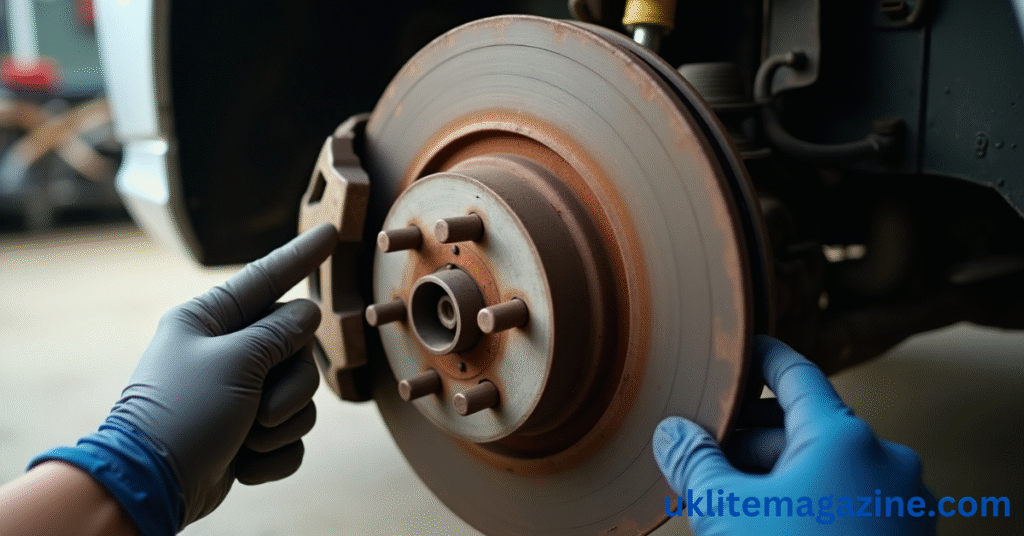Hearing your brakes squeak can be annoying—and sometimes alarming. While it’s not always a sign of danger, it’s still something you shouldn’t ignore. Whether you’re on your way to work or heading out for a long drive, understanding why your brakes are squeaking can help you fix the issue early and avoid costly repairs.
In this article, we’ll cover the most common reasons brakes squeak, how to fix them, and when it’s time to visit a mechanic.
What Causes Squeaky Brakes?
There are several reasons why your brakes might be making a squeaking or squealing noise. Some are harmless, while others may indicate a more serious issue.
1. Worn Brake Pads
This is the most common cause of brake squeaking. Brake pads are made with a wear indicator that makes a high-pitched sound when the pads are getting too thin. It’s like a built-in warning system telling you it’s time to replace them.
Solution: Replace the brake pads as soon as possible to avoid damage to the brake rotors.
2. Moisture or Morning Dew
Sometimes, moisture like rain or dew forms a thin layer of rust on the brake rotors. When you first start driving, this rust can cause a temporary squeaking sound.
Solution: Drive for a few minutes and the squeaking usually stops as the rust wears off.
3. Dust or Debris in the Brakes
Dirt, sand, or brake dust can get stuck between the brake pad and rotor, causing a squeaking or grinding sound.
Solution: A quick clean-up with a hose or professional brake cleaner can remove the debris.
4. Lack of Lubrication
Brake components need proper lubrication to work quietly and smoothly. Without it, metal parts may rub together, creating squeaky noises.
Solution: Apply high-temperature brake grease to the contact points like the back of the brake pads or the caliper slides.
5. Glazed Brake Pads or Rotors
Hard braking or riding the brakes can cause excessive heat, which leads to glazed (hardened and shiny) pads or rotors. This makes the brakes less effective and noisy.
Solution: Resurface or replace the affected parts to restore proper braking function.
6. New Brakes Breaking In
If your brakes are new, squeaking is normal for the first few hundred miles. The pads and rotors need time to “bed in” or adjust to each other.
Solution: Follow the manufacturer’s instructions for breaking in new brakes, and the sound should fade on its own.
When Should You Be Concerned?
While some squeaks are harmless, others might be a warning sign of a more serious problem. Here are a few signs you should take seriously:
-
The squeaking gets louder over time
-
You feel vibrations when braking
-
There’s a burning smell from the wheels
-
The brake pedal feels soft or spongy
If you notice any of these symptoms, it’s best to have your brakes inspected by a professional.
Easy Fixes You Can Try at Home
Here are a few simple things you can do if your brakes are squeaking and there are no major signs of damage:
-
Wash the brake area: Use a hose or pressure washer to remove dust and dirt.
-
Apply brake lubricant: Add grease to the necessary parts to reduce noise.
-
Replace the brake pads: If they’re worn or low-quality, upgrade to better ones.
-
Check the installation: Improperly installed brakes can cause squeaks—double-check if you’ve done them yourself.
Overview of Brake Squeak Causes & Fixes
| Cause | Is it Serious? | Easy Fix |
|---|---|---|
| Worn brake pads | Yes | Replace brake pads |
| Moisture/rust on rotors | No | Drive for a few minutes |
| Dust or debris in the brakes | No | Clean with brake cleaner |
| Lack of lubrication | Yes | Apply brake grease |
| Glazed pads or rotors | Yes | Resurface or replace |
| New brake installation | No | Allow time to break in |
Conclusion
Brake squeaking is a common problem that can be caused by something as simple as moisture or as serious as worn-out pads. The key is to pay attention to when and how the noise happens. Some fixes are simple and can be done at home, while others may need a mechanic’s help. Don’t ignore the sound—it’s your vehicle’s way of telling you something might need attention.
Frequently Asked Questions (FAQs)
How do you fix squeaky brakes?
To fix squeaky brakes, identify the cause first. Common fixes include replacing worn brake pads, applying brake lubricant, cleaning out debris, or resurfacing the rotors. If the brakes are new, the squeak may go away after the break-in period.
Is it OK to drive with squeaky brakes?
It depends. If the noise is from moisture or dust, it’s usually safe. But if it’s due to worn pads or glazed rotors, you should get it checked out. Ignoring it could lead to more expensive damage or even brake failure.
Why do my brakes squeak if my pads are still good?
Even if the pads are still good, squeaking can occur due to dirt, moisture, lack of lubrication, or glazed rotors. It might also happen if the brake components aren’t installed correctly.
Why do my brakes squeal when I brake lightly?
Light braking doesn’t generate enough force to suppress vibrations between the pads and rotors, which can cause squealing. This is more common with high-performance or ceramic brake pads.
Why are my brakes squealing with new brakes?
New brakes may squeal during the break-in period. It takes a few hundred miles for the new pads and rotors to seat properly. If the squealing continues after that, it might be due to incorrect installation or lack of lubrication.

